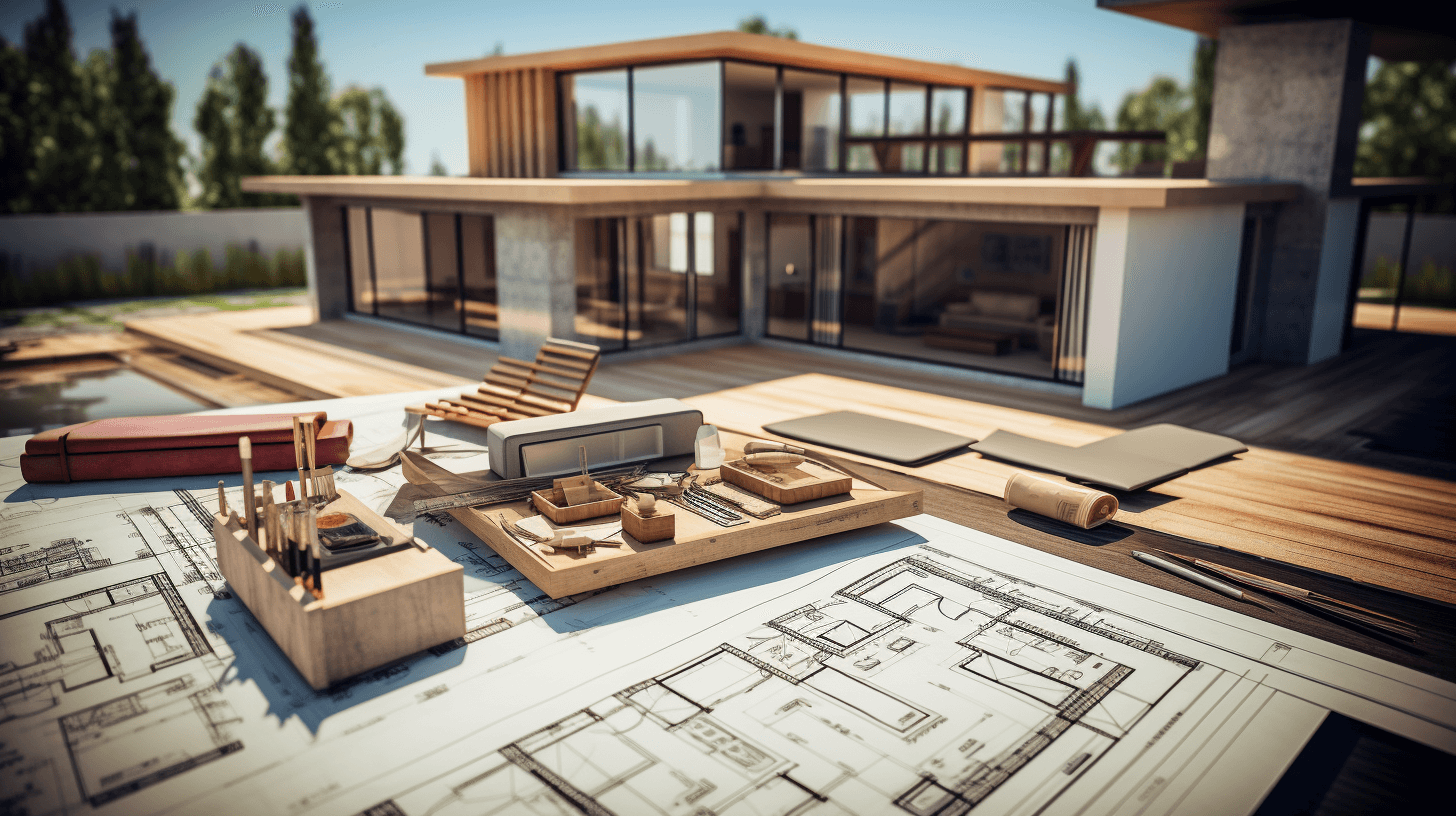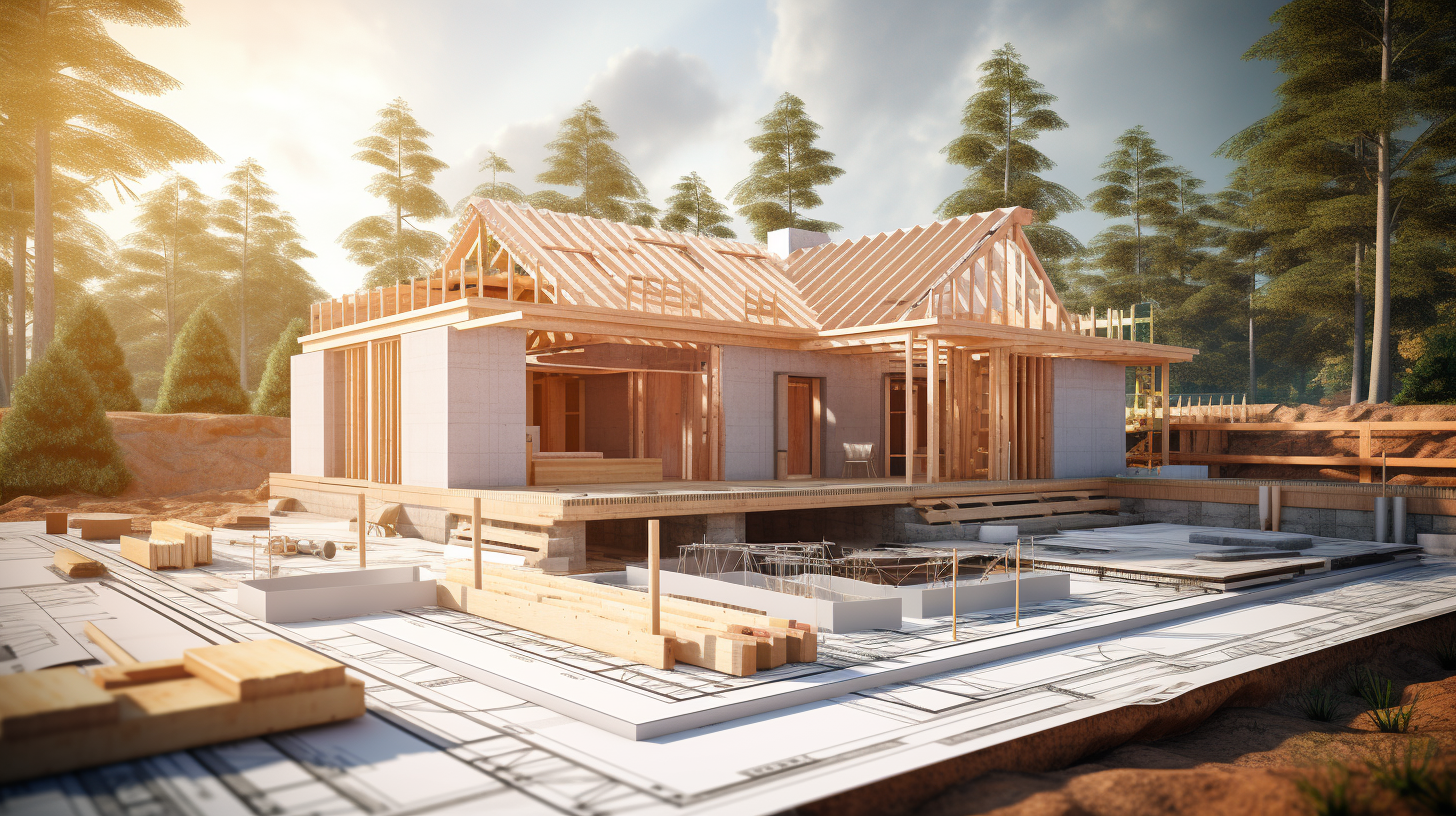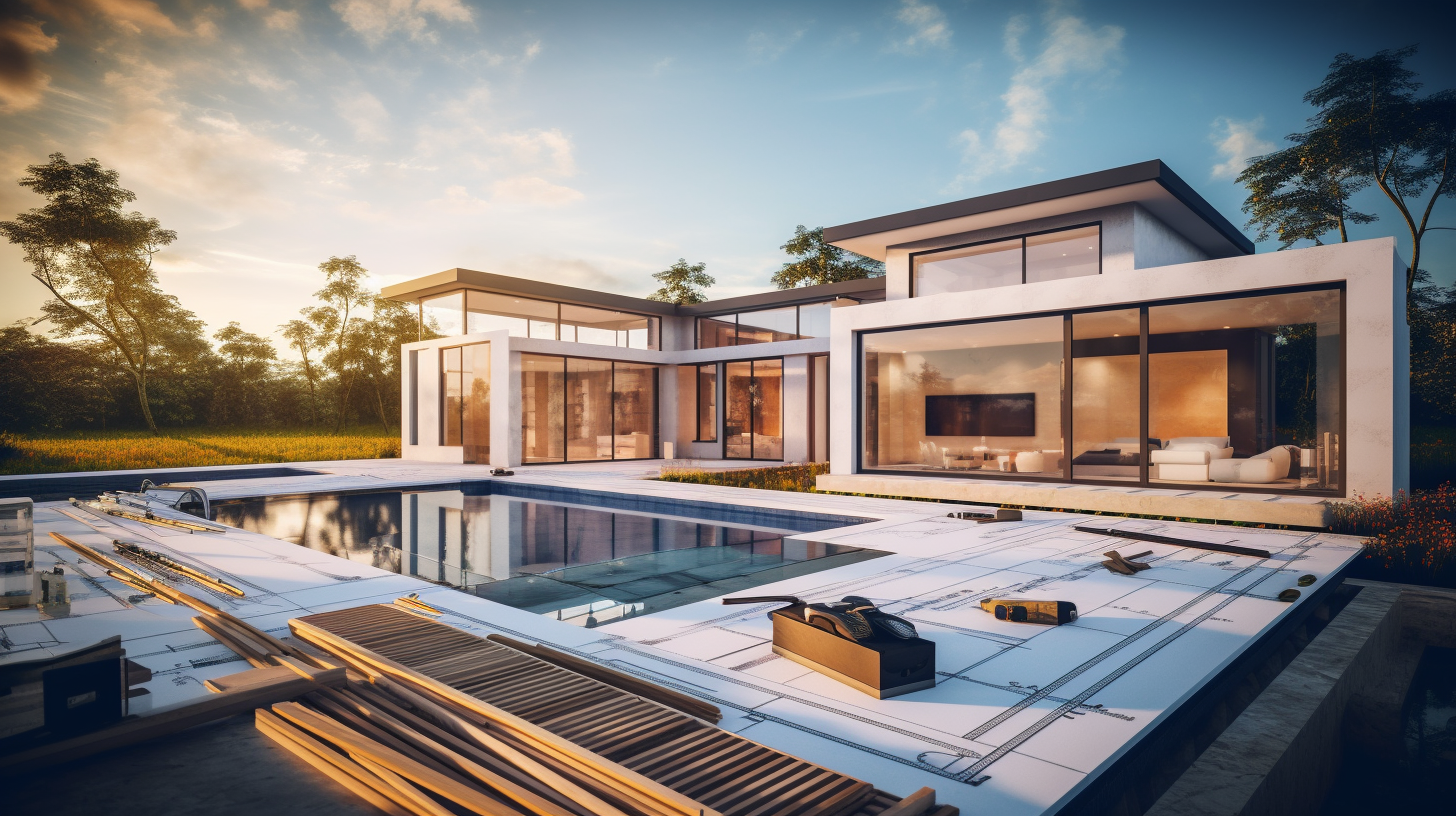The Art of Serenity: Utilizing Pastels in Interior Design for a Calming Ambiance
 24 Sep 2023
24 Sep 2023
 1394 View
1394 View

Embarking on the journey of constructing your new house is an exciting and daunting endeavor. From envisioning the layout to choosing the right materials, there are countless decisions to make - and it's easy to feel overwhelmed. That's where our ultimate checklist comes in. Whether you're a first-time homeowner or a seasoned builder, this comprehensive guide will walk you through the entire construction process, ensuring that nothing slips through the cracks.
Our checklist covers all the crucial aspects, beginning with the initial planning and budgeting stages. We delve into the permits and regulations you need to navigate, as well as the key considerations when hiring contractors and architects. From there, we dive into the nitty-gritty details of the build itself, including selecting the right foundation, framing, and roofing techniques. We also provide tips on energy-efficient and sustainable construction practices, helping you create a home that is not only beautiful but also eco-friendly.
With our detailed checklist, you can approach your new house construction with confidence, knowing that you have covered all the essential elements. So, let's get started on creating the dream home you've always wanted.
The first step in constructing your new house is finding the perfect location. Consider factors such as proximity to schools, workplaces, and amenities, as well as the overall neighborhood vibe. Research the local real estate market and consult with a real estate agent to identify potential areas that align with your preferences and budget.
Once you've narrowed down your options, visit the prospective locations to get a feel for the surrounding environment. Pay attention to the quality of infrastructure, accessibility, and potential for future development. Take note of any zoning restrictions or building codes that may affect your construction plans. By carefully selecting the location of your new house, you'll set the foundation for a successful construction project.
Before diving into any construction project, it's crucial to establish a realistic budget. Start by determining your overall financial capacity and how much you're willing to invest in your new home. Consider factors such as the size of the house, the complexity of the design, and the quality of materials you desire.
Consult with a financial advisor or mortgage broker to explore your financing options. They can help you assess your borrowing capacity and guide you through the loan application process. Remember to factor in additional costs such as permits, insurance, and contingency funds for unexpected expenses. By setting a well-defined budget from the start, you'll have a clear understanding of what you can afford and can avoid financial stress during the construction process.
Choosing the right architect and contractor is essential for a successful house construction. Begin by researching professionals with experience in residential projects and a portfolio of work that aligns with your vision. Read reviews, ask for recommendations, and conduct interviews to assess their expertise, communication skills, and compatibility with your project.
Collaborating with an architect during the design phase is crucial to ensure that your house reflects your lifestyle and preferences. They will help you transform your ideas into a functional and aesthetically pleasing floor plan. Once the design is finalized, it's time to hire a reputable contractor who will oversee the construction process.

Embarking on the journey of constructing your new house is an exciting and daunting endeavor. From envisioning the layout to choosing the right materials, there are countless decisions to make - and it's easy to feel overwhelmed. That's where our ultimate checklist comes in. Whether you're a first-time homeowner or a seasoned builder, this comprehensive guide will walk you through the entire construction process, ensuring that nothing slips through the cracks.
Our checklist covers all the crucial aspects, beginning with the initial planning and budgeting stages. We delve into the permits and regulations you need to navigate, as well as the key considerations when hiring contractors and architects. From there, we dive into the nitty-gritty details of the build itself, including selecting the right foundation, framing, and roofing techniques. We also provide tips on energy-efficient and sustainable construction practices, helping you create a home that is not only beautiful but also eco-friendly.
With our detailed checklist, you can approach your new house construction with confidence, knowing that you have covered all the essential elements. So, let's get started on creating the dream home you've always wanted.
When it comes to constructing your new house, hiring a reputable architect and contractor is essential. These professionals will be responsible for turning your vision into reality. Begin by researching and interviewing several architects and contractors to find the ones that align with your style and budget. Look at their portfolios, check for licenses and certifications, and ask for references from past clients. This will give you a better idea of their expertise and track record.
Once you have narrowed down your choices, meet with each architect and contractor to discuss your project in detail. Ask about their design process, construction methods, and how they handle unexpected challenges. It's important to establish clear communication and a good working relationship from the start. Don't hesitate to ask for a detailed contract that outlines the scope of work, timeline, payment terms, and any warranties or guarantees.
Remember, hiring professionals who are experienced, reliable, and have a good reputation will ensure that your new house construction runs smoothly and efficiently.

Before you can start building your new house, you'll need to obtain the necessary permits and approvals from your local government or municipality. These permits ensure that your construction project complies with building codes and regulations, and that it is safe for occupancy. The specific permits required may vary depending on your location and the scope of your project.
Start by contacting your local building department or planning office to determine the permits you need to apply for. They will provide you with the necessary forms, fees, and requirements. Common permits include building permits, electrical permits, plumbing permits, and mechanical permits. It's important to submit your applications well in advance to avoid delays in the construction process.
Keep in mind that you may also need to obtain approvals from homeowner associations, architectural review boards, or other governing bodies. These approvals ensure that your new house construction aligns with any neighborhood or community guidelines. Be sure to check with these organizations early on to understand their requirements and timelines.
By taking the time to obtain the necessary permits and approvals, you can avoid legal issues and ensure that your new house construction is compliant with all regulations.
The layout and floor plan of your new house will determine how functional and comfortable your living spaces are. It's important to carefully consider your lifestyle, family size, and future needs when designing these aspects. Start by envisioning how you want the different rooms and areas of your house to flow and connect.
Consider factors such as the number of bedrooms and bathrooms you need, the size and placement of the kitchen and dining area, and the location of common spaces like the living room or family room. Think about the amount of natural light and ventilation each room will receive, as well as the overall aesthetic you want to achieve.
Work closely with your architect to create a floor plan that maximizes space and functionality. They will be able to offer valuable insights and suggest design elements that you may not have considered. Don't forget to incorporate any specific features or amenities that are important to you, such as a home office, a dedicated laundry room, or outdoor living spaces.
By investing time and effort into designing the layout and floor plan of your new house, you can ensure that it meets your needs and enhances your daily life.
Choosing the right materials and finishes for your new house is crucial for both aesthetics and durability. Start by researching different options and gathering samples to get a feel for the textures, colors, and styles that appeal to you. Consider factors such as maintenance requirements, longevity, and eco-friendliness.
When it comes to materials, opt for high-quality options that will stand the test of time. This includes everything from the foundation and framing materials to the roofing and siding. Consult with your contractor and architect to understand the pros and cons of each material and make informed decisions.
For finishes, think about the flooring, countertops, cabinetry, and fixtures that will be used throughout your new house. Consider both style and functionality, ensuring that the finishes you choose complement each other and create a cohesive look. Don't forget to factor in your budget and prioritize areas where quality matters most, such as kitchens and bathrooms.
By selecting high-quality materials and finishes, you can create a new house that is not only visually appealing but also built to last.

Managing the construction process and timeline is crucial to ensure that your new house is completed on schedule and within budget. Start by establishing clear communication channels with your architect, contractor, and any other professionals involved in the project. Regularly scheduled meetings and progress updates will help keep everyone on the same page.
Create a detailed construction schedule that outlines the different phases of the project, including milestones and deadlines. This will allow you to track progress and identify any potential delays or issues early on. Be prepared for unexpected challenges that may arise during construction, such as weather conditions or material shortages. Flexibility and proactive problem-solving will be key to keeping the project on track.
During the construction process, it's important to conduct regular inspections and quality control checks. This ensures that the work meets the required standards and is in line with your expectations. Work closely with your contractor to address any concerns or issues that may arise, and make sure that all necessary adjustments are made before moving on to the next phase.
By effectively managing the construction process and timeline, you can minimize delays and ensure that your new house is completed to your satisfaction.
The Art of Serenity: Utilizing Pastels in Interior Design for a Calming Ambiance
 24 Sep 2023
24 Sep 2023
 1394 View
1394 View
The Impact of Technology on Construction
 15 Jun 2023
15 Jun 2023
 1314 View
1314 View
Sustainable Design: Eco-Friendly Materials for Your Home
 05 Sep 2023
05 Sep 2023
 1310 View
1310 View
The Newest Construction Material Trends
 22 Jun 2023
22 Jun 2023
 1155 View
1155 View
How to Streamline Your Construction Supply Chain
 10 Mar 2023
10 Mar 2023
 1003 View
1003 View
Transform your child's space with our Kids' Room Makeovers - where fun meets....
 24 Oct 2023
24 Oct 2023
 405 View
405 View
Transform Your Patio into a Serene Outdoor Haven: Expert Tips and Tricks
 24 Oct 2023
24 Oct 2023
 659 View
659 View
Top Smart Home Devices for Modern Living
 24 Oct 2023
24 Oct 2023
 495 View
495 View
The Ultimate Showdown: Luxury vs. Budget Bedding - Which Will Reign Supreme?
 24 Oct 2023
24 Oct 2023
 580 View
580 View
Master the Art of Spring Refresh: Expert Tips on Decorating with Florals
 24 Oct 2023
24 Oct 2023
 480 View
480 View
Discover the Hidden Gems: Unveiling Vintage Treasures for Your Modern Spaces
 18 Oct 2023
18 Oct 2023
 596 View
596 View
The Impact of Color on Emotions: Discover How Interiors Shape Your Mood
 18 Oct 2023
18 Oct 2023
 814 View
814 View